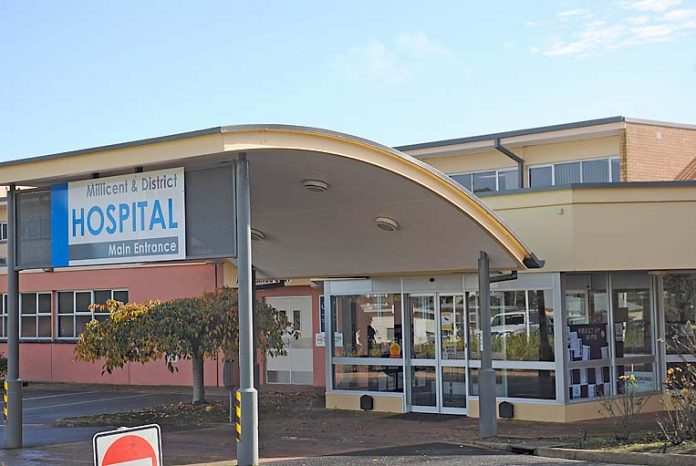A MAN has raised concerns with the continuity of care at the Millicent and District Hospital after his wife died from a chest infection shortly after she was discharged from the health facility.
Tantanoola resident Dean Thiele’s wife Pat died on October 7, 2019 as a result of an infection, with her general practitioner not receiving official notification of her death until eight days later.
Ms Thiele was admitted to hospital on September 28, 2019, citing chest pains and a general ill feeling.
After one night at the facility, Ms Thiele was given a prescription for antibiotics and discharged from the hospital.
“She got out and she was not well all week,” Mr Thiele said.
“On the Saturday before she died, I got the ambulance out here and on the Sunday, her chest just gave up.
“She died on the Monday.
“I had to go to our doctor a few weeks after Pat died to get a prescription for myself and when I was there, my doctor asked when Pat died,” he said.
“I told him she died on the 8th and he looked up at the screen and said he was officially notified on the 15th and I could not believe it.”
Mr Thiele claimed given his wife’s history, his GP told him there was “no way she should have been discharged the next day”.
“Once you go into the hospital, there is no consultation with your own clinic doctor,” he said.
“They have the background of what is going on and you have a chance to pick it up earlier.”
“Pat has emphysema and our doctor treated her for two years before she died, so he knew a lot about the problems,” Mr Thiele said.
“Having that experience and knowledge about what has happened before has to be a hell of an advantage.
“If you are going on hearsay from the patient or reading about the problems, you do not have anywhere near the insight you would have if you just speak to the clinic doctor.”
His concerns have been echoed by doctors at the Medical Clinic Millicent, who in a statement said was difficult to provide continuity of care “when we find out about death via hearsay or in death notices of the paper”.
“We value continuity of care for our patients and their family,” the statement said.
“We are often called upon to explain the care given in another facility and arrange follow up care.
“This is very difficult without a discharge summary.”
The clinic said the absence discharge summary documents, which capture details about the patient’s hospital stay including the diagnosis, procedures performed, the prognosis, medications prescribed and follow up actions, was an “ongoing difficulty that we face in the clinic”.
“It makes providing follow up care very difficult,” the clinic said.
In a statement, the Millicent and District Hospital Health Services said it was not routine practice to notify GP clinics in the event of a death due to privacy reasons, but GPs are “often notified as a courtesy”.
The hospital said doctors and GPs can contact each other directly to discuss patient care or obtain medical information if required, with the patient’s consent.
“As always, the privacy and confidentiality of our patients is paramount and only GPs with admitting rights to the hospital can access a patient’s medical notes,” the statement said.
“Patients are given a medical summary by their GP and are required to bring it with them to hospital to ensure continuity of care with their doctor.
“When patients are discharged from hospital, they are provided with a medical discharge summary to give to their GP for treatment review.”
According to the Australian Medical Association, effective transfer of care arrangements between hospitals and GPs when patients are admitted to and discharged from hospitals can reduce readmissions following their treatment.
President Dr Tony Barton said the association remains concerned about the inconsistency of transfer of care arrangements and said too many transfers are not meeting best practice.
“Where appropriate and effective transfer of care practices are undertaken, redamissions are reduced and adverse events minimised,” he said.
“Unfortunately, missing discharge summaries and slow – or no – communication too often leads to poor patient outcomes.
“A patients GP is their main provider of ongoing health care.
“Maintaining strong GP involvement in the patient’s care will provide the best outcomes.”
The AMA’s position statement recommends hospitals should advise the GP within 24 hours if a patient presents or is discharged to a hospital, or if the patient dies.
Mr Barton said digital technology, including Mr Health Record has the potential to improve transfer of care arrangements, but it did not replace direct communication with a patient’s GP.
Mr Thiele said greater communication between the hospital and the clinic could have resulted in a different outcome.
“Doctors are not miracle workers, but if there was better communication between the two there could be a chance Pat might still be alive,” he said.
“This shows the whole system is a failure.”








